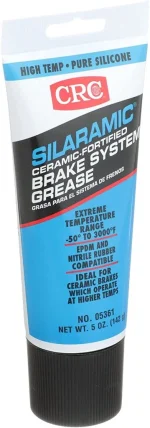Sorry, a bit late to the party on this.According to Subaru, Niglube RX-2 can be replaced with ConocoPhilips Multiplex Red #2.
I don't think Niglube is the correct product for slide pins if it can also be used for ball joints, etc.
https://static.nhtsa.gov/odi/tsbs/2021/MC-10198758-0001.pdf
Please give this product a try from Wurth. Silicone Lubricating Compound 8 Oz, Product Part Number: 08902211
I have tried and tested many Brake Caliper Slide Pin lubricants and found this to be the best hands down. Yes, its pricey, but an 8 oz Tube will last a long time, you don't need much. I use the Wurth Silicone Compound only on the slide pins, not on the Caliper Bracket Slide contact points. I use Anti-Seize on the slide contact points. I have a contracting business with 5 Trucks, and we do all our own maintenance. We have had trucks reach 1,000,000 kms, yes we live In ONtario Canada and have harsh winters, lots of road salt and sand exposure. A local Auto Service Shop got us onto the Wurth Silicone Compound. I was complaining that I have tried every caliper slide pin lubricant I can find and always had to perform a brake service every Spring and Fall (Yes, Twice a Year) on every truck to keep away from sticky or seized slide pins, also the caliper bracket contact slide points. He said to try this, he gave me an opened tube of Wurth Silicone Compound, approx half full.
After doing a brake service using the new Wurth product, we performed a brake service inspection on one of the trucks at six months, looked like we just greased the slide pins, we cleaned up the caliper bracket slide points and put it back together. At this point we started using the Wurth Silicone Compound on the entire fleet. We checked again in another six months, so now a year, every slide pin still coated with a moist coating of silicone compound, though looking thinner. No hardness, or stickiness of the Silicone. I decided to not re-service the brake calipers on this particular truck and use this truck as a road test pilot. This truck was my personal company truck and decided to see how long we could go. I did some periodic inspections on my truck, the other trucks we moved the brake service to once a year. The savings was huge, as we used to do this twice a year on every truck. FYI, a year was too long using the other NAPA products, there would always be a sticky or ceased pin. So we decided to be pro-active and service the brakes twice a year, Spring and Fall.
At two years since performing a slide pin service on my personal truck, using the Wurth Silicone Compound, we observed no seizing issues, the pins removed by hand, thumb and finger only. There was no corrosion on any of the pins surface area, the pins were still moist with silicone, though thin in a few spots. The cool thing about this product is that it is rubber friendly, so you can lube the rubber boots inside and out without worry about the boots getting sloppy or distorted with and chemical reaction. Boots still look like new. I believe that by putting a liberal amount of the silicone product inside the boots to fill the recess of the rib in the boot, helps seal the pins from road grime and salt. In the past using other products, we noticed that sometimes the boot rubbers would be distorted or stretched and not lock into the grove on the bracket housing and pin groove.
We are now performing our brake services on the fleet vehicles once a year in the fall. I did an experiment on my wife's 2012 MDX and went three years on the front & rear brakes with periodic inspections again as a test only. She drives only 4 kms to work with a few short trips to the bank for work and back home for lunch. She hardly uses the brakes to warm them up, dry out the moisture exposed to our heavily sanded and salted winter road conditions. There was no corrosion or seizing of the slide pins. Pins removed easily by thumb and finger. Now doing complete brake service every year, just to clean up the bracket slide contact surfaces. It is amazing how many kms we can get out of our rotors by performing regular brake service. Some trucks have reached 160,000 kms on one set of front rotors and 250,000 kms on rear rotors.
FYI: We flush the brake fluid every two years using AMSOIL Dot 3-4 Synthetic Brake fluid and have never replaced a caliper ever in our shop since performing annual brake service on the fleet.
Can't, say enough good about this product. I had no idea that there was a company out there that makes high performance products that provide value and performance for the money. Previous to talking with our friend at our local auto service shop, I had never heard of this company. They do not use heavy marketing like most companies, they are still privately owned and I think all their products are manufactured in Germany.

